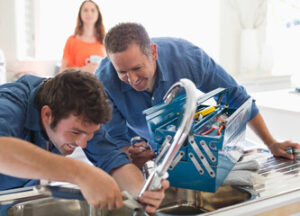How to Become a Plumber
Plumbers are skilled professionals responsible for the installation, repair, and maintenance of piping systems that distribute water and gas and handle waste disposal in residential, commercial, and industrial settings. Their expertise ensures that these essential services function properly and safely.
Unlike many other careers that require years of schooling and massive student debt, plumbing offers on the job training. This allows you to start earning while learning the trade. Visit https://www.plumbing-express.com/ to learn more.
Plumbers install and repair pipes, fixtures, and appliances, such as bathtubs, showers, sinks, toilets, and faucets. They may work on residential, commercial, or industrial plumbing systems. They also inspect and test piping, soldering joints, drains, and water heaters. Other job duties include interpreting blueprints, installing backflow preventer valves, and repairing leaks. Plumbers must have strong attention to detail and be able to work safely in high-risk areas.
Plumbers also provide maintenance and repair services for kitchen equipment, such as stoves, ovens, dishwashers, and refrigerators. They may also install and service heating, ventilating, air conditioning, and water filtration systems. Plumbers must have good customer service skills to interact with customers and provide estimates. They must be able to read and interpret blueprints and technical diagrams. Plumbers must also have physical strength and stamina to lift heavy tools and work in various weather conditions.
Plumbing is a trade that directly impacts people’s lives, providing them with clean drinking water and ensuring that waste is removed efficiently. It is also a career that offers many opportunities for advancement, including becoming a master plumber. Many graduating high school seniors assume that they must attend college to build their careers, but there are plenty of other options available for them, including apprenticeships and the trades.
If you’re interested in a career that offers stability, excellent pay, and great job security, then look no further than plumbing. Plumbers are always in demand, and their work is critical to our daily lives. From fixing clogged drains to maintaining massive pipe systems in factories, this is a career that can offer you endless possibilities for growth and development. So if you’re ready to start your journey as a plumber, then here are some of the job duties that you’ll be expected to perform on a day-to-day basis:
Education and Training Requirements
There are a few different routes you can take to become a plumber. One option is to enroll in a formal plumbing certification program at a college or trade school. These programs typically combine classroom learning with practical hands-on experience. Another option is to enter a plumbing apprenticeship, which can last anywhere from two to five years. These programs usually involve working under an experienced journeyman plumber while completing on-the-job training and classroom instruction. Some apprentices choose to join a union, which can provide additional training opportunities and benefits like health insurance.
Once you’ve completed a formal training program or apprenticeship, it’s time to apply for a license. Depending on your state, this could require passing a written or practical exam. In addition, some plumbers need to complete continuing education courses to keep their license active. These courses can include topics like sewage systems, water supply, and gas fittings.
If you’re interested in a career in commercial plumbing, consider taking advanced courses on the installation of large-scale water and gas lines. These classes can teach you how to read blueprints and prepare for inspections. These skills can help you advance to the position of a lead plumbing engineer, where you’ll be responsible for laying pipe and overseeing other workers.
As a plumbing technician, you’ll also need to be proficient in the use of hand and power tools, as well as building codes. You’ll need to understand how to use various materials, including copper, PVC, CPVC, cast iron, and steel. It’s also important to be able to identify and repair problems, such as leaks, overflows, and improper draining. Plumbers should also be comfortable operating in confined spaces and at heights, so it’s best to practice these skills before you start your job. Lastly, it’s essential to be customer service-oriented when dealing with clients because their trust and satisfaction play a big role in your success as a plumber.
Work Environment
Plumbing is a highly specialised job that can be quite challenging. It involves working in confined spaces, tight corners and awkward positions for long periods of time. These conditions can cause muscle and bone injuries if the plumber is not careful.
Plumbing workers can also be exposed to extreme weather conditions such as heat, cold and rain. These factors can increase the risk of work-related injuries and illnesses such as dehydration, heat exhaustion and hypothermia. Despite these risks, the demand for skilled plumbers remains high, making it an excellent career choice for those who want to earn a stable salary.
Plumbers often need to communicate with their clients, explaining the issues they face and recommending solutions. They also have to keep abreast of new technologies and techniques in the field. A commitment to continuous learning can help plumbers advance their careers and improve the quality of their services.
A career in plumbing can be rewarding and exciting. It is a great option for people who enjoy meeting and working with different people on a daily basis. This can forge relationships that can generate income in the future, which can be a major benefit of this job.
Unlike other jobs, plumbing is a physical trade that requires the use of heavy tools and equipment. It can lead to back and shoulder injuries if not performed correctly. For this reason, it is important for plumbers to follow good safety practices and wear personal protective equipment such as gloves, goggles and a hard hat when performing their duties.
Plumbers can be self-employed or employed by private companies. Self-employed plumbers have more flexibility when it comes to scheduling and the type of projects they take on. They may also be able to charge higher rates than employees and make more profit.
Plumbers are a vital part of society, providing essential services such as water supply and waste disposal. Without these services, the human population would be at risk of disease and death. Plumbers can play a significant role in ensuring that these systems function properly and efficiently, which is why the job is so rewarding for those who are qualified to do it.
Salary
Plumbers make a good living but their wages vary depending on where they live and the type of work they do. Cities with high costs of living typically pay their plumbers more to offset higher housing and food prices. For example, a master plumber in Los Angeles may make more than $120,000 a year while an apprentice in rural Ohio might only earn $35,000. The state of the job market also plays a role in salary rates. For example, aging buildings and city infrastructure require maintenance and repairs that drive up demand.
Certifications also influence salary rates. Those who have earned specialized credentials in areas like backflow prevention or EPA Section 608 can add $5,000 or more to their yearly earnings. Additionally, plumbers who specialize in eco-conscious systems can command a premium income since these services are increasingly in demand.
A career as a plumber can be lucrative if you are willing to invest time and energy in education and training. However, it is important to consider the responsibilities of this role before you commit to it. In addition to installing pipes and fixtures, plumbers are responsible for ensuring that their work is performed correctly according to code. Those who do not adhere to industry standards and protocols run the risk of expensive mistakes that can impact customer satisfaction and the overall reputation of the plumbing profession.
Plumbers often work with hand and power tools to complete their tasks, and they must be familiar with a wide range of materials, including copper, plastic, galvanized iron, and steel. Some plumbers also use specialized tools to measure, cut, and weld pipes. They are also responsible for inspecting and maintaining pipe systems, water heaters, and garbage disposals.
In addition to earning a healthy wage, plumbers can supplement their income with overtime and holiday pay. Many plumbers also earn money by selling or promoting industry-related tools and services. Those who want to boost their income can also choose to join a plumber’s union, which can provide them with competitive wages and robust benefits like healthcare and pensions.






